Conquering the college learning curve
Seniors Jasmin Hernandez (right) and Emma Petersen (left) discuss their future plans in front of the College and Career Center. Here, students get to see where alumni have settled post-graduation in the previous year.
With decision day behind us, the class of 2023 is scrambling to prepare for their future. Whether staying in state or even studying abroad, the possibilities are endless. It is easy to meander through online tours and campus visits, but there is nothing quite like experiencing that future firsthand.
When it comes to preparations, there is no better group to seek advice from than those who have made the decision already: college underclassmen.
College can be a scary place. Oregon State University and University of Oregon are common choices for Oregon students due to their price and proximity.
The trend continues with Katya Karlipati, class of 2022. This Wilsonville alum attends the Oregon State University honors college studying biochemistry, and her experience has been nothing short of success.
She reflects on her time at university as being somewhat similar to her experience in earlier education.
“It is laid back and there isn’t a lot of competition. I feel like I can go at my own pace to learn,” Kalipati comments.
There is seemingly a more independent atmosphere, and a lot of students find themselves thriving in this free environment.
Additionally, she has also not seen a significant change in her grades.
“I have been doing pretty similar in college as I did in high school, but I do have to study a lot more to be able to do that. Before coming here, I wish I had learned how to do that properly,” she claims.
Katya is not the only student finding more difficulty establishing new learning habits in a college environment. In an experience built solely around academics, and can be difficult to get away from that rigorous life.
Subsequently, university is centered around learning, meaning there are more resources available to the enrolled student. Access to technology, exposure to like-minded peers, focused environments, libraries, and study groups all make college life possible.
Even in private colleges, alumni reveal that higher education is simply difficult. At New York University, the story stays the same.
Alice Kang, a 2021 Wilsonville High School graduate attends NYU for biochemistry, and regards college as a different caliber than high school.
“This really depends on the classes you take and the professors you get. Some classes are less rigorous. Other classes require hours and hours of out-of-class studying as well as weekly quizzes, midterms, and finals,” the alumni explains.
While the school you attend definitely makes a difference, the fact that college is further education simply denotes that more learning will take place. Even so, the great consensus is that there is simply a learning curve, and it isn’t all that bad.
Those who appreciate the art of learning will have no problem adjusting to college life, according to WVHS alumni.
Higher education is a wonderful decision for a student to make, and furthering one’s education is a common and life guiding experience for most. At the end of the day, students should be concerned with learning as much as they can throughout their education, and appreciating the years that lie ahead of them.
According to educationdata.org, 15.85 million students are currently attending university in the United States for undergraduate programs. Students venture to college every year, and one thing graduates can be sure of is that they are not alone.
Whether going to community college, studying abroad, or heading to a state university, after-high school is one of the most important times for recent graduates.
Alumni will always be there to lend a helping hand. Using college for connections and experience is far more important than caring too much about initial success. The best advice for college bound students is simply to use the world around them and brace for college as it comes–prepare for the learning curve.











